#Lament for Icarus
Explore tagged Tumblr posts
Text


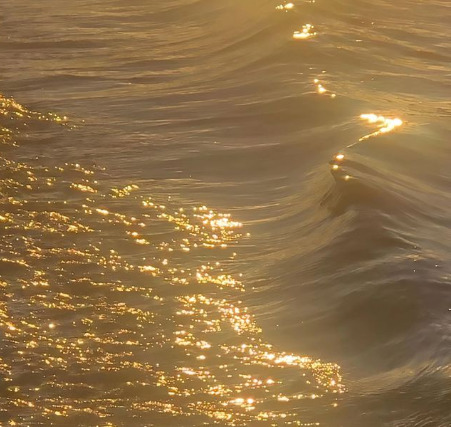

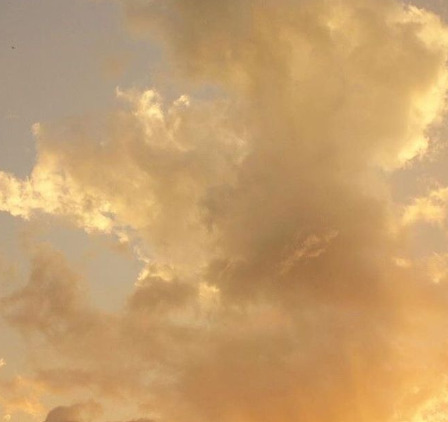
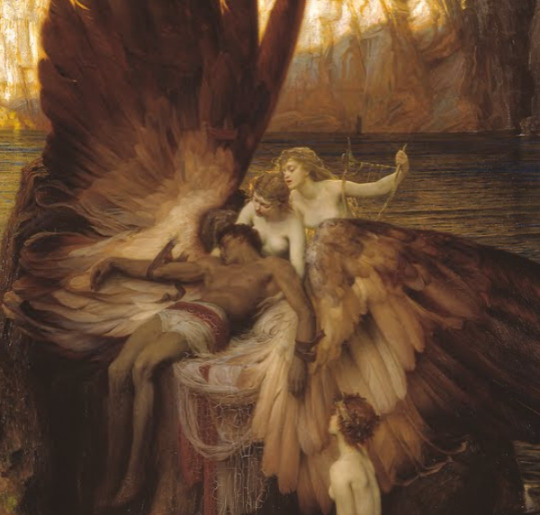

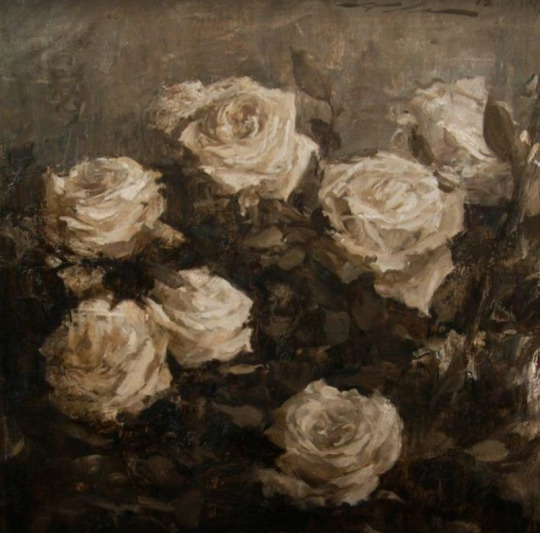



"icarus imagined himself to be the stick of a candle, the wings to be the wick, and the sun to be the flame. for a small time, the wick would burn. the candle would be alight, shining brilliantly, lighting up the space for as long as the wick could last. until inevitably, the wick reached its end, the candle burning out. until the wick finally died, reaching the stick of the candle and engulfing that, too, in flames."

#quote by me#the short story i wrote retelling the myth#i love icarus#my favorite greek myth#that middle painting is my phone wallpaper#there's so much analysis and like meaning#and so many interpretations#and just AUFDHGS#anyway i might make moodboards more this is fun#divider by steddiecameraroll-graphics#greek mythology#ancient greece#greek myth#greek myth aesthetic#the fall of icarus#lament for icarus#icarus#moodboard
128 notes
·
View notes
Text
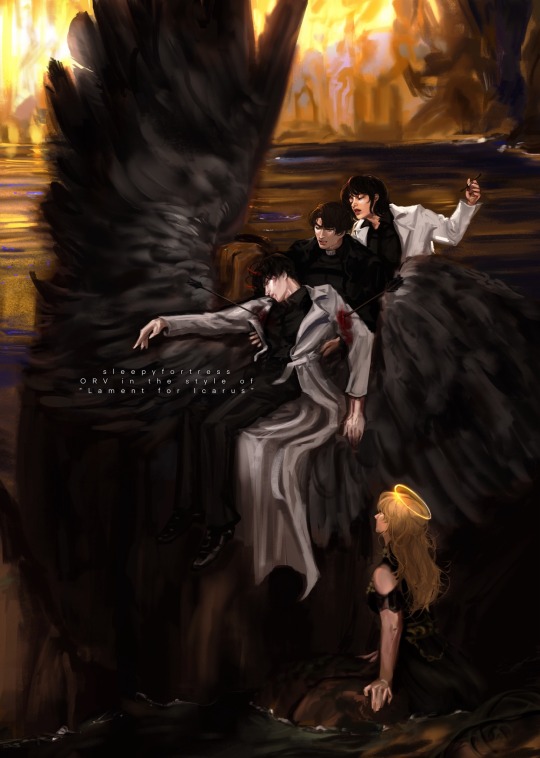
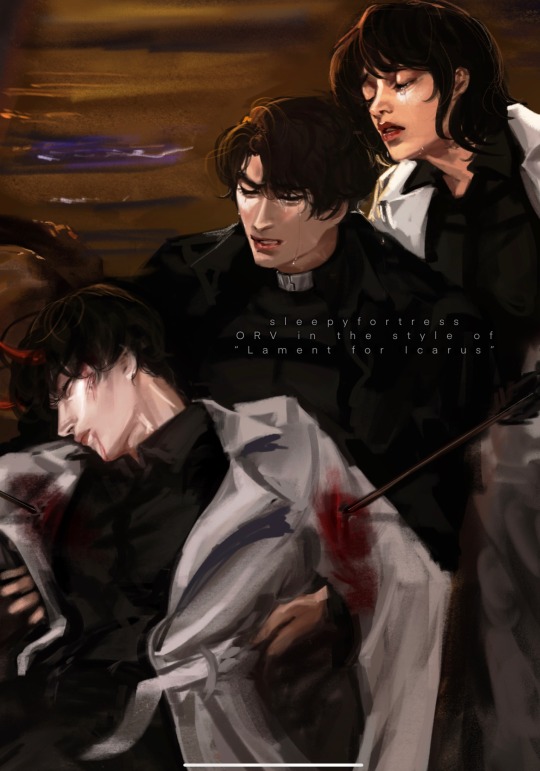
A study of “Lament For Icarus” by Herbert Draper but make it ORV
#kim dokja#kdj#yoo joonghyuk#yjh#han sooyoung#hsy#uriel#orv uriel#omniscient reader fanart#omniscient reader's viewpoint#orv#lament for icarus#repaint#it wasn’t hubris that brought him down though#originally was gonna draw this as a Hades piece#but ORV is too strong
456 notes
·
View notes
Text




MOURN NOT FOR ICARUS~
ABOUT: very long, 8562 words
STORY: retelling of the greek myth with an addition to the end
WARNINGS: i mean i guess he dies lol
A/N: i wrote this almost a year ago but i've mentioned it a few times and people said i should post it so im posting it on my writing blog instead of my main.

There was a bird out the window. Icarus could not identify it, for he had never received formal education. However it was small. Each feather on its wings varied in different shades of brown, and it had a black face. Icarus watched as it flapped its beautiful wings, so gracefully flying across the view outside, and delicately landed atop a tall mountainside tree. The small bird did not have a nest in the tree. It only landed on a shaky branch and looked out at the scene below.
Icarus understood why the gentle creature simply perched itself there. He himself was perched at the windowsill, staring out at the ocean below. He found the rhythm of the waves mesmerizing. But more interesting than the movements of the water was what laid below. The tower in which Icarus and his father were trapped in was, though an unfortunate circumstance, built at the edge of a mountain. He could see the sea lapping onto the bottom of the cliff. It was hard not to appreciate the natural beauty of the sight.
Ahead, at the horizon, were more rocks and mountains, more islands. King Minos has imprisoned both Icarus and Daedalus on the island of Crete. After what his father had done, Icarus didn’t see the punishment fit, especially as he had nothing to do with it. Yet there he was, sitting in the tower, admiring the cities from behind a window that would mean certain death if he leaned only a little closer.
“Icarus,” his father’s voice spoke from behind him. The young boy turned around quickly at the call of his name. He was met with the sight of Daedalus working with a collection of feathers and wax, an already agreed upon method to get themselves out of there. “Help me with these wings.”
He was quick to do as he was told, glancing back at the view and the bird only once more before retreating from the windowsill. “Yes, father.” Icarus took those few steps closer to the center of the room, though it wasn’t far since the room was small.
The surrounding walls were old and adorned with nothing but dust and the slight growing of moss between the stones. Even the floor was empty, for there was no reason for King Minos to provide the prisoners with anything other than what was needed to fulfill basic needs, which he classified as food and water. Even those were given sparingly.
Daedalus sat on the ground leaning over the incomplete wings. The frame was already completed, made of materials that Icarus couldn’t quite recognize. He had never been much of an inventor like his father, but although he never took interest in it, he always found it fascinating to watch. His eyes followed his Daedalus’ weathered hands as they bent the wire frame, preparing the wax and feathers. There were leather straps on either side, presumably for their arms when they wore the wings.
Icarus stepped closer and kneeled next to his father. Daedalus said nothing at first, holding the frame out in front of him and assessing his work. Then, with a nod of self-confirmation, he turned to Icarus. “No,” he told the boy when he tried to touch the wire. “Stand up, son. And put your arms out. I must add the feathers, but I cannot do so with the wings on the floor.”
That statement made Icarus’ eyes brighten. He was already excited to fly; he’d been looking forward to it since his father first introduced the idea of it to him months ago. He knew that was the day that it was finally going to happen, the day they were finally going to free themselves from their prison, but now it was becoming more real. Once he had his wings on, all Daedalus had to do was put on his own and they would be able to jump from the window without falling to their deaths.
So, doing as he was told, Icarus stood up and opened his arms. He watched in awe as Daedalus carefully slid the straps of the wings over his arms, the leather cool and smooth against his skin. Icarus hadn’t noticed another strap that was placed upon his torso, attaching the frame to his back.
He could not tell Daedalus’ emotions as he did this, for his face was expressionless, focused solely on not breaking the wings. However once he finished, Daedalus stepped a few steps back as if to admire his creation.
Icarus turned his neck to look at either arm, which were weighed down only slightly by the metal frame attached to them. Though the feathers weren’t done being added, he still smiled. He was only getting closer to the moment of inevitable freedom.
The boy smiled at the thought, and at the wings themselves. Even if they were not finished, and even if he was not one to build such things, he did admire them almost as much as his father did. They were carefully constructed, delicate but strong so that it would be able to support his weight. A smile tugged at the corners of his mouth, one of genuine joy and excitement.
“I look like a bird, father,” Icarus laughed. It was a small observation, a comparison that made him smile wider. Daedalus’ face had been more critical as he had been examining the wings and how they looked on his son, trying to figure out the best way to attach the feathers, but his gaze softened at the childlike curiosity that came from Icarus. Daedalus’ eyes moved from the frame on the boy’s small body and met Icarus’ eyes, a small smile of his own growing on his face.
“Yes, I suppose you do.” With a nod of approval, Daedalus then decided to begin with the feathers. Icarus continued to admire the wings on his back, waving his arms up and down until his father told him to stop before they broke. Then, Daedalus started working.
He had planned this for a while, but had to be careful as he worked to make sure that everything was done exactly and precisely as it should. He developed a technique of dipping the feathers into wax and carefully placing them on the wired frame of the wings. It took much patience and standing still, which was not easy for a young Icarus. Icarus had been standing there with his arms out for too long, and he was getting restless. Daedalus noticed this and decided to talk to his son in order to distract him from moving too much.
“Do you remember what I’ve told you about flying?” Daedalus asked softly as he worked. He was standing behind him, so Icarus stared out the window as he answered. Icarus noticed the bird was still there.
“Yes, you said that we must be careful,” Icarus replied. “You said that the wings are strong, but not perfect.” Daedalus nodded as he placed another feather on the wings. He was getting closer to finishing.
“And what must we do to be careful?” He pushed, wanting to ensure that Icarus knew what was needed to be safe while flying. Icarus sighed, as he had been warned many times of what to do, even before that day. Daedalus had the idea for so long that he had been explaining the dangers to Icarus far before the wings were close to being constructed.
“Do not fly too high or too low,” the boy spoke, echoing what he’d heard time and time before.
“That’s right. Because too high and the sun will melt the wax, and too low and the water from the sea will dampen the feathers. We do not wish for the wings to break.”
Icarus knew this. He’d been told this plenty of times. Daedalus also understood that the repetition of these rules were most likely an annoyance to Icarus, but he still felt the need to reiterate them. Icarus had always had a sense of curiosity, a look of awe at everything his eyes perceived. He was inquisitive. Sure, Daedalus admired that; he was glad that his son had at least inherited something from him, if not his interest in inventing. But he knew how Icarus could be, and knew that no matter how many times he reminded him, a small part of Icarus would still want to explore the sky. Daedalus had to do his best to emphasize the danger to his son.
However the boy only found it irritating. Icarus knew what to do and knew that if he went too high or too low then the wings would break. It was obvious to him that he wouldn’t be so reckless as to put himself in danger like that, so he didn’t appreciate Daedalus saying the same thing over and over. Yet deep down, Icarus knew that his father only cared for him and wanted him to be safe. So he tried not to let it bother him too much, and to appreciate the love from his father.
Daedalus continued for what was a little under half an hour until he finally finished the wings. When he told him that he was completed, Icarus practically jumped up, though he was already standing. Icarus’ smile only grew wider as he spread his arms out and looked at the wings.
He didn’t know where Daedalus had gotten the feathers, he only knew that he had been collecting them for a while. So Icarus didn’t know which bird they belonged to, however they were a light tan color, almost an off white. Though they weren’t the right shade of brown, he couldn’t help but compare the wings to those of the bird out the window. It was a bird that he had been seeing a lot, though he wasn’t sure if it was the same one each time or simply the same species. Either way, his mind kept returning to the bird as he thought himself to be similar.
Icarus’ excitement was palpable. He laughed as he lifted his arms up and down, mimicking a flapping motion. They were a bit heavier now, though not by much. The feathers were beautiful when they were all pressed together by wax, and he couldn’t even see the frame anymore.
Daedalus looked pleased, not only to see the wings completed, but also to see his son so eager to fly. But of course before they could fly, he had to get his wings on and make them. Daedalus had started a bit on his own before, just to see if it was possible to do while someone wasn’t wearing them, but decided it might be best if someone else were to do it. However he couldn’t let Icarus put them on as he attached the feathers because Icarus was already wearing his pair. So Daedalus had to ever so carefully use the wax, like before, to put the feathers on his own wings.
But that wouldn’t work forever. Eventually, he got to a point where the wings wouldn’t balance somewhere on their own, so he had to put them on and asked Icarus to help him with the last few feathers.
Of course Icarus was more than willing to help. He wanted to be able to feel important, to feel like he was actually doing something useful and aiding their escape rather than just standing there and waiting impatiently for his father to have his wings ready to fly.
Icarus quickly went to stand behind his father, who had already put the almost-done wings on his back, and did as he was directed to finish them. He tried to imitate the movements of Daedalus in the way that he had been using wax to attach the feathers to the wings’ frame. As he spoke he worked, rambling mostly out of anticipation.
“You know, father, when we escape, the first thing I want to do is eat a proper meal. It’s been far too long since we’ve had that opportunity. Actually, maybe I will drink cleaner water first. That is a smarter decision.” Daedalus only listened with an amused smile on his face as his son spoke. “Perhaps the first thing I will eat is an olive.”
That made his father chuckle. “An olive? Is that so?”
Icarus nodded, placing another wax-dipped feather on the wings. “Yes, an olive. I like olives. I haven’t had one since we’ve been imprisoned.”
“Yes, well, the olive tree is the sacred plant of goddess Athena,” he explained, wording things carefully so as to not upset the deity. “And I will tell you, humbly of course, that my genius for inventing and such was a blessing from the goddess of wisdom herself.” That made Icarus’ eyes widen. He hadn’t known that. “So, as my son, perhaps she will favor you and give you the best olive.”
The young boy grinned. It was new information to him that his father was blessed by a goddess, let alone one as powerful as Athena. And the idea that she would favor him as well was exhilarating, even if it only resulted in a single, well-tasting olive.
Finally, after what felt like a lifetime to the impatient Icarus, but couldn’t have been more than an hour, they were finished. Icarus placed the last feather on his father’s wings, and Daedalus checked his own and his son’s to make sure they were intact and in the right condition to fly. Icarus, though not saying anything about it, was proud of himself for managing to finish Daedalus’ wings for him, even if the job had been relatively small. Just as he wanted, he felt important, he felt useful.
And now the time had finally come for the wings themselves to be useful.
The moment he decided they were finished, Daedalus got straight to the point. “We must be quick, Icarus,” he told his son. “I do not know how much time we have.” They both knew that he didn’t mean time left in the day; the sun, shining in all its glory, was still directly above them in the sky. However it was King Minos, their captor, who they feared. He did not enter their prison often, almost no one did, but those who were meant to feed them or check on them would come at arbitrary intervals. At any second could someone enter and discover their plan for escape. If that happened, there would certainly be punishments- punishments that Daedalus did not want Icarus to have to live through.
Icarus only nodded, understanding what his father was thinking. He waited for further instruction, but already knew that their next move was going to be: fly.
Daedalus stepped closer to the window starting by simply looking out and assessing the view, noting the height at which they were at and how if the wings were to break or malfunction, they would not be able to survive the fall. Especially not if they landed in the water. He took a deep breath and turned back to Icarus, who had also been looking out the window eagerly.
“I know I have told you countless times before,” Daedalus began once more, wanting to stress as much as possible the dangers to his son. “But you will stay by me. When we jump out this window, give yourself a couple of seconds for the wings to begin gliding; do not panic if you feel you are to fall because you will not fall.” Icarus let out a sigh of irritation, but Daedalus continued. “And you will stay behind me as we fly. As I’ve said, do not go too high, as the sun will melt the wax, and do not go too low, as the water will dampen the feathers. Do you understand?”
Daedalus knew that Icarus understood. He knew how much the boy cared about himself. He knew that he would never do something so reckless as to risk his life, he knew that. Icarus had so much to look forward to in his life; he was young and had much potential. Even if he wasn’t aware of it himself, Daedalus knew that the young boy had so much of his life ahead of him. He would never do something to lose that.
“Yes, father.”
For a few moments, their eyes were met. They both were aware of the risk they were about to take, of how much danger they were putting themselves in. Even if Icarus did as he was told, and even if Daedalus was so sure of his wings, there was always a chance that things would go wrong. Not just the possibility of a flaw in the making of the wings, but also the looming possibility that the gods themselves would interfere.
Zeus was the god of the sky. If he wasn’t happy with them in his domain, he could easily strike them down before they even made it to the next island. Daedalus knew this. That was a risk he was willing to take.
He nodded, and then broke eye contact with his son.
One last time, Icarus looked around the small room that had been their unwelcome home for too long. The cold stone walls and floor. The furnishings, or lack thereof. The damp scent. He was relieved to be leaving, to have the smell of moss overgrowth replaced by that of the ocean. Not only relieved but, of course, excited. He took a deep breath and turned back to the window. The bird was still there, sitting out on the tree. But when it suddenly got up and flew away, Icarus no longer watched it in jealousy, for he knew that at last he would get to do the same.
Daedalus took the final moment before their escape to say a prayer. He prayed to Zeus, wishing for the king of the gods to grant them safe passing over his skies. They were not out of Zeus’ favor, the father and son, but not necessarily within it, either. And since the gods didn’t simply reply to favors like that so quickly, there was nothing more they could do in that moment than pray and hope he was in a good mood that day.
Then, that was it. There was nothing else. No more wings to finish, no more rules to reiterate, no more prayers to be said. They had done everything part of their plan but one. There was only one thing for them to do, and it was jump out that window and finally, finally, be free.
No words were exchanged between the two of them, only another small nod of acknowledgment, as Daedalus took the initiative to step up to the windowsill first. If the wings wouldn’t work, he told himself, he wanted to be the one to find out. Not Icarus.
Icarus watched, his impatience only growing, as his father carefully climbed into the small window. He had to be careful in how he fit himself in it, so that the wings would fit as well and not be squished in the cramped space. Icarus let himself take a few steps closer, too. Because the moment Daedalus took off, it was only a matter of seconds until he would have to follow.
The man did not look back to see Icarus’ reaction. He didn’t want the boy to realize the fear in his eyes. He didn’t want him to notice the shaking in his hands as he got so close to the edge, closer than he ever would, because normally that close would mean death. But this was not normal. They had wings, and they would fly.
“Go.”
That was the only warning Icarus had that his father had jumped. It took him longer than it should have for him to actually process what he’d just watched: his father jumping out of a window. Yes, there were wings, but for a few seconds, it simply appeared that he had fallen. He was now alone in the tower. There really was no turning back.
When he snapped back to the present, Icarus rushed over to the window and tried not to focus on how high up he was, how he couldn’t find Daedalus in the sky at first glance, how small everything was below. He forced himself to take a deep breath, climbed into the windowsill, and closed his eyes, holding his breath as he jumped.
Icarus was falling.
That was the first and only thing he could register. He didn’t open his eyes, didn’t grant himself the horror of seeing how fast he was falling towards the ground. He knew the wings would work, Daedalus had warned him that it would take a few seconds before they actually began to glide. But those few seconds were terrifying.
Icarus could hear his heartbeat in his ears, almost drowned out by the wind rushing past him. He could also feel that wind, through his hair, through his entire body. He felt the disorientation of tumbling, his stomach turning, heart pounding, breath taken from the shock of the moment. Panic settled in- why wasn’t he flying? He was supposed to fly. The wings clung to him, feeling more like dead weight than anything else. They weren’t working, he thought. They weren’t working, they weren’t working, they weren’t-
As he fell, Icarus suddenly felt a change. A subtle resistance to the pull of gravity. The wind slowly stopped rushing past him, and as it slowed down he reminded himself to spread his arms out even more. His eyes were still squeezed shut, but he forced himself to open them once the falling had slowed.
Icarus was flying.
He was flying like the bird he’d been watching enviously for far too long. He could no longer feel the wind rushing past him, but as the breeze picked up, he felt he was part of the wind. With his eyes open now, Icarus allowed himself to look down with no fear. He was not scared anymore. He was thrilled.
The view below was even better from the sky itself than from the window. He could actually see the rest of the town to his right, which he hadn’t been able to see from the tower. There were homes, buildings, the little ants below he realized were people, and trees- olive trees. He smiled at that. Not only at that but the fact that he was flying. He was doing it, he was finally doing it! This was the most amazing moment of his life.
Directly below him was the sea. It was a beautiful combination of green and blue and even white with the foam from the waves. Above him was the sky, the clear sky. There were no clouds, only the bright, brilliant sun against the blue above.
But, of course, he could never get too close to either of them.
Icarus shifted his focus. He had to find his father and follow him, as he’d been instructed. He lifted his head from admiring the sights to looking about the sky around him, letting out a breathless sigh of relief when he saw Daedalus several feet ahead of him. The man was facing him, too, as if they’d been searching for each other.
It was a strange sight, seeing Daedalus flying. The wings on his back looked so gentle, and he knew how delicate they were. They were strong, however, clearly enough to carry the large man. They looked like they didn’t quite belong on Daedalus. In a way, they almost made him look like an angel.
Icarus chuckled to himself at that thought, though it was probably a bit more animated than usual since he was already experiencing so much joy. He wondered if he, too, looked like an angel.
The father and son were far apart, but the moment their eyes met there was an unspoken understanding. Even if they couldn’t quite make out the other’s expression, even if there was no way they’d be able to hear the other if they actually spoke, they could tell how the other felt. Daedalus let himself smile at the complete, genuine joy his son was exuding. Then, making sure that Icarus was still going the right direction with him, he turned away and focused himself on flying towards the nearest island that was not the one they’d just escaped from. He could see it in the distance, not much further. They’d just have to keep going on the straight path, and they’d be there soon enough.
Icarus knew that this was the goal, to get to another island and be free. Drink fresh water, eat an olive, whatever they wanted to do. And seeing the island, so close yet so far, was only making it more exciting.
For a long while, they simply flew. It only took Icarus a couple minutes to get the reins of the wings and figure them out. He quickly taught himself how to turn either direction, how to angle himself upwards or downwards. But he didn’t use that, of course, other than where he had to in order to direct himself in the right direction after Daedalus. He stayed close behind his father as they flew together, feeling the wind beneath his arms and breathing in the air, salty from the ocean below.
It was then, in experimenting with the mechanics and controls of the wings, that Icarus made his mistake.
He began carefully, still heeding the warnings that Daedalus had given him. Icarus let himself glide lower, closer and closer to the water’s surface. It was gradual and considerate, not to put himself in danger. He knew the risks of getting too close, he knew that he should just stay directly behind his father. But he could still see Daedalus from where he was, a little below him now, and Daedalus was not looking back anymore. So as long as he continued to be careful, he could test the limits of the wings without them breaking. Or so he thought.
Icarus slowly descended lower. It was almost that same feeling of free falling before, but this time much more controlled. There was not a single ounce of panic in him as he got closer to the water. The wind was rushing past him again, making it all the more exhilarating. Icarus was careful to spread the wings out as much as he could and use them the right way as to not lose control.
When he got close enough, he could feel the water on himself. He was just low enough so that he wasn’t touching the ocean, but he could see it right there, right in front of him. The greens, the blues, the whites, the shining reflection of the sun. He could feel the cool droplets of water against his bare arms, too caught up in the pure delight of the moment to realize that the wings were being wet by the water, too.
Icarus was laughing. He was smiling. He was happier in that moment than he had ever been in his whole life. After so long being imprisoned, he felt free. This moment, being by the water, was more freedom than he could have ever imagined. He didn’t want it to end; he wanted that moment to last forever. He wished he could be suspended in time, always feeling such liberation and elation.
Since that wish was impossible, he decided to take it a step further.
He was already taking a major risk by allowing himself to get so close to the sea. He’d been told exactly not to do that. Icarus respected his father, loved his father, and would never intentionally go against him. But the lure of it all was too big. The feeling he got from it all was indescribable. He felt invincible. So far, Zeus had accepted their prayer for mercy in his realm and was allowing them safe passage. Maybe, Icarus dared to hope, Zeus was allowing him this moment. Maybe he was letting him risk the dangers because he understood.
The king of Olympus was not an understanding god. But Icarus didn’t know that.
Icarus allowed himself another deep breath, breathing in the salt from the ocean, taking in the reality of the moment, before swooping back up to meet the same level as his father in the sky. Daedalus seemed not to have noticed that Icarus had done such an unsafe thing, and was continuing to fly.
Once he was back where he was supposed to have been all along, Icarus only flew straight ahead for a minute or so until he just couldn’t resist the temptation of something different this time- not the sea, but the sun.
Icarus looked up. If he had already gone too low without the wings being ruined, he could go a bit higher, right? Perhaps Daedalus had just been underestimating the strength of his wings. If he really had been blessed by Athena, surely they would be able to withstand a little heat from the sun. They’d survived the water, so he was certain that they’d survive the sun, too.
So he took that risk and flew up. By this point, he had so much control over the wings, had figured out the small details with such perfection in such little time, that he knew how to raise himself higher and higher, steadily moving himself up into the sky.
Daedalus still did not notice. He had made the mistake of trusting that his son would never be so reckless, would never be so ignorant to his own warnings. He did not look back and see that Icarus was no longer behind him. He did not know that Icarus was in fact getting so distracted and off-path that he could not even see Daedalus in the sky anymore. He did not realize that Icarus had been blinded in the most literal sense by his desires. If he had noticed, maybe he would have been able to do something to save him from himself.
Icarus, on the other hand, was relieved that his father did not realize. He knew that it would only anger him. So he could not say why he was doing it, why he was getting higher, why he was allowing himself the pleasure of attempting to reach the sun itself. It was not that he wanted to disobey his father. He did not want to go against his orders. He only wanted to have fun, and fun did he have.
He was carried away by the moment, not realizing what he was really doing. Icarus just kept getting higher and higher, closer and closer to the sun, farther and farther from Daedalus, who remained oblivious. Icarus’ laughing had restarted again, the smiling on his face growing impossibly wider. He thought he had felt good close to the water; this was even better. The bigger the clouds and sun looked above him, the smaller everything else looked below him. He was soon able to actually feel the heat of the sun on his skin, more than one did on the ground. He could feel it on his face, like that of the flame of a candle. Warm and inviting, friendly, egging him on to get closer, convincing him that no harm could be done. He was having too much fun, being too foolish that he actually believed it.
It stayed that way, all fun and entertaining. The pull of the sun was so incicing. The thrill of the flying itself was too great. The feeling of it all was the best thing he had ever experienced, the best high--to the most exact meaning--that he knew could ever be achieved. Icarus was, in that moment, the closest any mortal had ever been to the sun, the highest anyone had ever been in the sky.
Icarus was the closest any mortal had been to the gods.
And he felt like a god. He felt invincible, infallible, strong, powerful, he felt unstoppable. He felt like he had become that bird that he had admired. He felt like he could fly anywhere, do anything, touch the sky. That was exactly what his mind was set on doing.
Things didn’t change when Icarus began to smell something off. It wasn’t the smell of the ocean- no, that was long gone. He’d gone far too high for that. It was a smell that was accompanied by the sensation of something hot against his skin. Something other than the heat of the sun itself. He was so intoxicated by the pure feeling of euphoria that it took him longer than it should have for him to realize that the feeling of heat and the scent that he couldn’t put his finger on was actually coming from the wings.
The sun was melting the wax, just as Daedalus had warned.
Icarus didn’t stop when he felt this. He was still consumed by that sense of power and god-likeness. He didn’t want to stop, regardless of the wings melting.
Perhaps he realized that it was too late for him by then. Perhaps he realized that he was too far from the island to make it, he was flying over the middle of the ocean, not close enough to any to manage to glide himself to safety. Perhaps he realized that once the wings had begun to melt, there was nothing he could do about it. Perhaps he realized that he was going to die.
So there Icarus was, flying like a bird for the first and last time. He didn’t let himself come to terms with the fact that he was not going to get that one olive, the fact that he was not going to have any of the hopeful future that had been promised to him. He did not want to be overwhelmed by the reality that he was not going to get to apologize to Daedalus for disobeying. He only wanted to continue feeling the hot sun, not the hot wax. To feel that freedom one last time.
In what he realized to be his final moments, he let himself close his eyes. He once again did not want to see how quick he may have been falling to the ground once the wax completely melted from the wings.
Icarus imagined himself to be the stick of a candle, the wings to be the wick, and the sun to be the flame. For a small time, the wick would burn. The candle would be alight, shining brilliantly, lighting up the space for as long as the wick could last. Until inevitably, the wick reached its end, the candle burning out. Until the wick finally died, reaching the stick of the candle and engulfing that, too, in flames.
His laughter was the only sound echoing through the skies as he fell, the only thing alerting Daedalus that his son had flown too close to the sun and paid the price.
***
His mind was still swimming. He could barely remember what happened, and didn't know where he was. He sat up but kept his eyes closed. But wait, he thought, that was wrong. He shouldn’t have been able to sit up. He was supposed to be dead. He shouldn’t even have a body anymore, he shouldn’t be anywhere other than the Underworld. But light was seeping through his closed eyelids, and he knew with absolute certainty that he was not in the dark depths of the Underworld.
But then again, he’d also been certain that the wings would not melt under the sun.
Icarus reached a hand up to his forehead to try to stop it from pounding, almost losing his balance in the process. He took a deep breath, surprised that he had the capability to breathe. This was all wrong; he had died. He remembered the wings breaking entirely and sending him crashing into the ocean below. He remembered death; he remembered the moments before it, too, when he’d accepted his fate. Where was he now, and why did he feel alive again? “Icarus.” The voice that spoke his name was one of power. It was deep, serious, demanding respect. It made his name no longer just a name, but a command. He forced himself to look up and open his eyes, squinting them at the figure before him.
It was a man, a man who somehow carried youthful features yet an expression weighed down by years upon years. A man who was completely ageless, both extremely old and extremely young. The man had blonde hair and wore a perfectly white toga that managed to still look bright white against his pale skin. He was muscular and had a strong jawline. Everything about the man was… perfect. It took Icarus a few moments to realize that the man was watching him emotionlessly with glowing golden eyes. Then he realized that all of him was glowing, he was shining like the sun.
Icarus realized that the man before him was no man at all. He was a god.
When the realization set in, Icarus forced himself to stand up, ignoring the dizziness. Maybe it was a bad decision of him to try to stand up in front of someone so powerful, he should probably have kneeled, but being sprawled across the ground half sat up was probably not very respectful, either. When Icarus stood, he let himself look around and noticed that their surroundings were essentially all white. They must have been in the sky somewhere, in the clouds.
Icarus was so overwhelmed by the situation, not comprehending it all. He didn’t really think when he pointed his finger at the god--something he immediately regretted--and blurted the obvious:
“You’re Apollo.”
Then he quickly realized his error and tried to correct it with a sloppy bow. No one had ever taught the young Icarus how to act in front of a god. Thankfully, Apollo was not upset or insulted by the boy’s actions, though his expression remained blank. Icarus could not tell what he was thinking, and for some reason it made him anxious.
Apollo only nodded. “Indeed I am.” He watched as Icarus straightened up from his bow. Icarus felt like he was being scrutinized under the god’s divine eyes, and didn’t know whether to meet them or to look away. He was completely unprepared for this moment. “Take off those wings.”
Icarus hadn’t realized that the wings were still attached to him. They’d somehow stayed to his form into the afterlife- or at least he assumed this was the afterlife. He had no idea what was happening. Though now, the wings were mutilated. The wax had melted not entirely, but enough so they could not fly any longer. An entire part of the back was waxless, and everywhere else was either half-melted or had feathers missing. The sad remnants were clinging desperately to the now weakened frame. He obeyed Apollo’s order immediately and began fumbling to slide the leather straps off of him.
The wings fell soundlessly to the floor, which Icarus still didn’t know what that floor was. He then looked back up at Apollo, who still only stared at him. Icarus stood there uncomfortably for a few seconds, and then took the silent stare as his cue to step away. Once he did, Apollo stepped forward, leaned down, and picked up the wings, examining them with a certain detached interest.
“Fine craftsmanship,” the god noted, looking at the slightly-terrified Icarus again. “I assume your father made them?” The boy nodded quickly.
“Yes, he did. And I helped. Well, not with this pair but with his.” He then decided he should have left the answer at yes and not given unnecessary explanation.
He really was a mess.
Apollo nodded. He seemed to still not have been offended by Icarus’ unrehearsed nature. He simply spoke to him as if he were any other man, rather than a child who was both in awe and fear of the powerful being before him. Apollo turned his attention back to the wings, plucking a single feather off of them before dropping them back to the ground. Icarus cringed as he dropped them so carelessly but was afraid to say anything about it.
“Do you know why you are here, Icarus?” The speaking of his name once again made him nervous, as Icarus felt so minor and insignificant in the presence of a god. His name didn’t deserve to be said by Apollo’s mouth; he didn’t deserve to be speaking with him.
Icarus hesitated before answering. “Because… I died. But, forgive me if I am wrong, but this is not the Underworld.” Apollo waved his hand dismissively.
“No, no, of course not. I would never go down there. It’s quite the opposite of my realm.”
His realm. It took Icarus a few moments to think about that. Apollo was the god of many things, he knew that. Medicine, prophecy, music, archery, the sun-
Oh.
Icarus suddenly knew why he was there. His heart dropped to his stomach. He had been trying to do the impossible, to touch the sun. Daedalus had only been considering the god of the sky when deciding to pray for safe passage while flying. They hadn’t thought about the other gods who ruled the above, too. Had he upset Apollo with his recklessness?
“No, Icarus, you are not in the Underworld,” Apollo continued. “I stopped you on your path to Hades; I wanted to speak with you. Mortals die every minute, you see, but it’s not everyday I find one like you.”
Icarus swallowed hard. The way Apollo spoke, he still couldn’t tell what he was thinking about this whole situation. He couldn’t tell if he really had offended him or not, and it was nerve-wracking.
“I- I apologize if I insulted you, Lord Apollo,” he began carefully, the title sounding too formal for his young mouth. “I had no intention to.” Apollo shook his head.
“Do not apologize. To me, at least. I am not insulted. If anything I am flattered, really. Most mortals fear the sun; they fear me. You, however, seem to have no such opinion. It was quite entertaining to watch, I will admit. Such courage you have for such a young boy. I must ask, Icarus, why do you not fear me?”
Icarus was taken aback by that statement. He had flattered the god? By being an idiot. It didn’t make any sense. Apollo should have been offended, he should have wanted to torture or hurt Icarus in his afterlife after he attempted to go beyond the mortal realm. But… he didn’t. Icarus didn’t know how to react.
And the mention of his father, the reminder that he had gone directly against what Daedalus had instructed, hit Icarus like a punch to the gut. A reminder that he had disobeyed and gotten himself killed for it. He didn’t want to think about Daedalus just then; he wanted to figure out why and how he’d managed to flatter the god of the sun. Icarus took a deep breath.
“I do fear you,” he admitted plainly. He didn’t know what more to say.
Apollo was responding so casually that it made Icarus uncomfortable. He chuckled at his response, which didn’t make him feel any better- though Icarus had to admit that the sound of godly laughter was beautiful. “As you should, I suppose. But if you fear me, and I assume you must also fear death, why would you make such a rash decision and attempt to reach my sun?”
Icarus still was struggling to find the right words. He didn’t know how to explain his curiosity, it really had been an indescribable experience. The joy he’d felt in that moment was too much to ignore, he’d simply wanted to continue to go higher and higher. The skies had felt so limitless, the sun had felt so close. The consequences were unimportant as he flew, but now he was faced directly with them.
“Because I wished to feel free.” That was the only explanation that Icarus could manage. Apollo raised an eyebrow.
“Free? You would have had more freedom if you hadn’t died, would you not? You gave up the rest of your life for a small taste of freedom?”
Icarus only nodded. He was still at a loss for words, still trying to comprehend the entire interaction with someone so powerful. Apollo sighed, looking down at the small feather in his hand that he had taken from the wings.
“Mortals are interesting creatures,” he explained. “They are born, live for so little, then die. But they find so much more to their lives. They’re born nobody, yet believe that they can become something great. It’s almost saddening to watch this endless cycle of life and death. To see the excitement in their eyes as they embark on a journey that will inevitably lead to their end. I don’t understand how you do it, how you keep yourselves so optimistic when you know that in half a century, more or less, you will be nothing more than a memory to the rest of the world.
“Mortals value their lives, no matter how insignificant. So that is why you interest me. You want to live long, you want to be important, yet you let yourself come to an early end for the sake of something as small and temporary as a fleeting feeling.”
The god took a deep breath, running a finger down the soft feather, and looked back up at Icarus. The boy was only watching him, listening to an immortal’s perspective of mortality. If Icarus hadn’t been able to find the right words before, he was completely lost then.
Icarus met Apollo’s gaze. The immortal was looking at him with something in his golden eyes that was noticeable now: a look of sympathy. Compassion. Perhaps even pity.
He didn’t think a god to be capable of such human emotions.
“I mean… I just…” Icarus tried to provide the god some explanation to his unexplainable actions. Apollo was watching him with interest as he spoke, the emotion in his expression barely there yet still noticeable. Icarus spoke slowly, his mind still turning as he explained. “I didn’t want to die. I wasn’t thinking. I had been trapped for so long… I got carried away by it all. I- I felt free, like I wanted, and I didn’t want to stop. I wanted to make that feeling last forever.”
Apollo studied the boy before him. He took note of his imperfections, his mortality. Even in death, Icarus’ hair had been ruffled from flight. His arms were red, presumably as a result of the wax melting off the wings and onto his skin. His clothes were tattered. The look on his face was one of fear and vulnerability. Apollo was used to mortals looking at him with that sense of terror, but this was somehow different. Something about Icarus’ youth and innocence. Apollo still didn’t understand how humans worked, how they managed to make such careless decisions, how they grappled with their inescapable death. But watching this young man try to explain himself, he thought that maybe once he could at least understand.
“You are a fascinating mortal, Icarus. That is a compliment coming from me.”
Icarus swallowed hard. “Thank you.”
This entire conversation was unnerving, but he sensed a slight change in the god’s demeanor, perhaps a tinge of compassion. And he’d just been complimented by Apollo himself. He never thought that flying too close to the sun and doing exactly the opposite of what his father told him to do would lead to a compliment from one of the most powerful beings in the universe. But of the many things he was still unsure of in that moment, there was one question that came to mind:
“What will happen to me now?” He was almost afraid to ask.
“Well,” Apollo began. “You will go to the Underworld and be judged, as all mortals are. That will determine where you spend the rest of eternity. You are not receiving any special treatment in your afterlife; I simply wanted to speak with you. And spoken with you I have.” Icarus was silent for a few moments, but then nodded slowly. But before he could give a verbal response, Apollo spoke. “Your father will mourn you greatly.”
Icarus was once again taken aback by that. He couldn’t quite tell if that was simply the god stating the obvious, or if it was some sort of order or curse, and he was too afraid to ask. “Yes, I am aware.” But Apollo’s next words surprised him yet again.
“Do you wish for him to?”
Icarus froze. He didn’t want Daedalus to be saddened by his death, but of course he would be. His son had died, after all. It only made sense for him to mourn the loss of his own blood, the boy he had so carefully raised and loved. The child who’d become his closest partner in life. He didn’t want his father to be in grief.
“I wish for my father to be happy.”
Apollo nodded thoughtfully. “Happiness. That is what you felt when you fell, correct? Daedalus will know that. He will know that you were happy.”
Icarus’ eyes lit up. “You can do that?” He didn’t know if he would end up happy in the afterlife, or if he would receive punishment for being reckless. But at least in that moment, that small moment with Apollo, he was happy again. And Icarus knew that if Daedalus knew that, it would make him happy, too. Happiness was something neither of them had felt in so long. It was another feeling that had made the flight so intoxicating for Icarus.
“Yes,” Apollo said. “I can do many things.”
Then, before Icarus could express his gratitude, before he could say or do anything more, the entire moment shattered. Apollo disappeared, everything around them was gone.
His conversation with the god was done. He was no longer in the in-between of life and death. Icarus was dead and would have to face the consequences of his actions. He would have to be judged, his eternal fate decided once and for all.
But he would do all this with the knowledge that his father would know how he felt in those final moments. He would go to the Underworld knowing that he was happy then and now. He would enter the beginning of his afterlife knowing that eventually, Daedalus would get over the loss of his son.
Icarus didn’t know what Apollo gained from that conversation. He didn’t understand why the god had taken such interest in him. But he did know one thing for certain:
He had died, yes, but he had felt freedom. He had found that feeling of happiness that had been missing for so long. Perhaps he had a small sense of remorse for his actions. If he hadn’t died, he would have been free with Daedalus, and they could have lived long lives together out of the tower that had confined them for so long. But in the end, he accepted his fate. He really was happy.
Because even if it killed him, he had touched the sun.

the writing above belongs to me. please do not copy, modify, repost on other sites or claim as your own. © 2024 xxcxelum
#divider by steddiecameraroll-graphics#greek mythology#ancient greece#greek myth#greek myth aesthetic#the fall of icarus#lament for icarus#icarus#writing#idk what else to tag this as#i'll reblog to my main so its fine#original writing
25 notes
·
View notes
Text
The Coming Fire by Lament for Icarus
Bandcamp is donating their share of sales today to MusiCares for the LA fire relief effort. I'll donate whatever I get as well. seeing as the title and artwork of this EP were partly inspired by the 2019-20 Australian bushfires, it seems like the appropriate one to put forward.
I also just released a single from my dungeon-synth-or-something-like-that project Minotauros, plus there are a couple of things from my other electronic project Stelline on there too.
#mine#Lament for Icarus#Minotauros#post-metal#sludge metal#progressive metal#instrumental#dungeon synth#electronic#post-electronic#electronic rock#music#Bandcamp
6 notes
·
View notes
Text
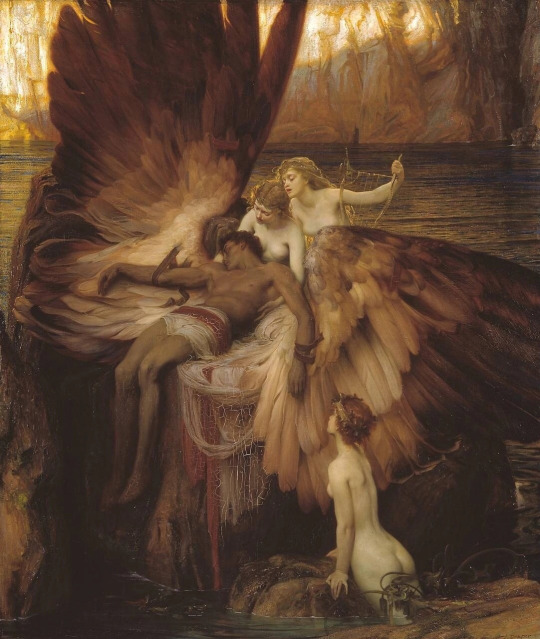
Herbert James Draper "Lament for Icarus" 1898 🪽
Herbert James Draper (26 November 1863–22 September 1920) was an English Neoclassicist painter whose career began in the Victorian era and extended through the first two decades of the 20th century. 🇬🇧
#Ohlala #classicart #classicalart #classicpainting #classicalpaintings #zeitgenössischekunst #mfpretty #aesthetic #traditionalart #nostalgia #Erotik #erotic #eros #erotique #lovelovelove #surreal #surrealart #surrealism #surrealismartcommunity #surrealist #surrealista #surrealistic #surrealisme #surreal_art #surrealismo #surrealpainting #retroart
Soundtrack: Maria by Orange Blossom 🪽
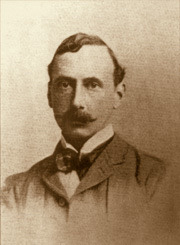
#l o v e#we need magic#mythology#5/2023#herbert james draper#Victorian#Neoclassicist#english#1898#Icarus#flight of icarus#Lament for Icarus#historical#classic art#traditional art#fable#fairytails#fairy core#x-heesy#fucking favorite#now playing#music and art#old art#🪽#contemporaryart
87 notes
·
View notes
Text
I really love reimaginings of classic art! 💕💕💕
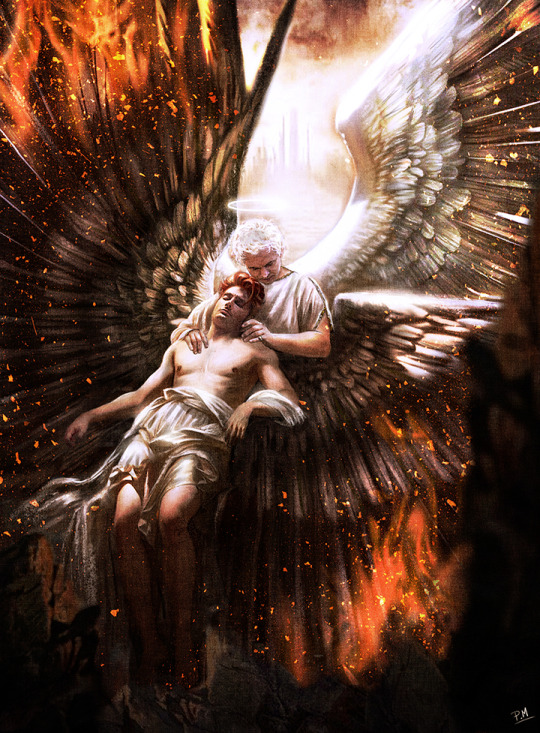
The Fall - (2023)
Inspired by The Lament for Icarus by Herbert James Draper.
#good omens#ineffable husbands#I know I've rebageled this before but I don't care#crowley#aziraphale#Lament for Icarus#herbert james draper#it's what he would have wanted
24K notes
·
View notes
Text
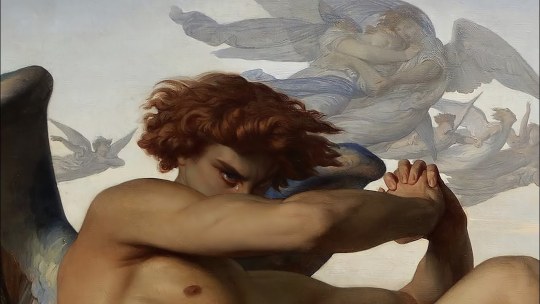
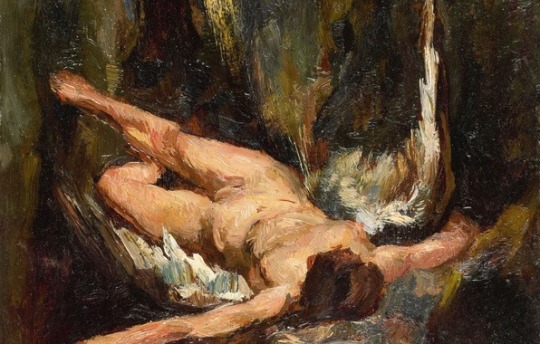
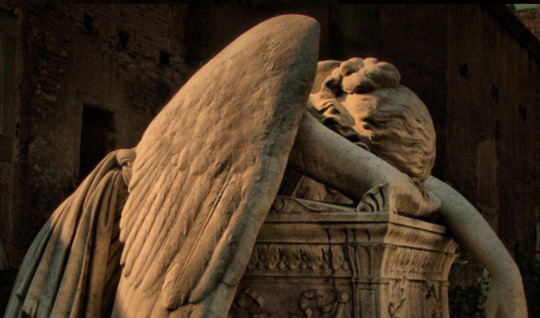
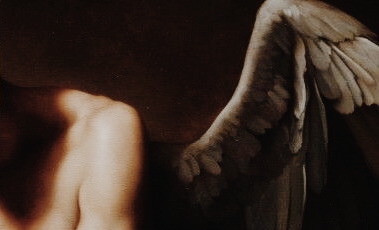
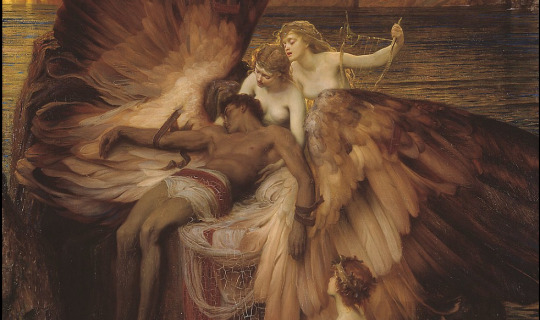

the fallen angel becomes a malignant devil
Fallen Angel, Alexandre Cabanel | The Fallen Angel, Willem de Zwart | Angel of Grief, William Wetmore Story | Fallen Angel, Roberto Ferri | The Lament for Icarus, Herbert James Draper | Art & Lies, Jeanette Winterson
#icarus is a fallen angel to ME!#where angels fear to tread#webweaving#web weaving#dark academia#classic academia#light academia#the fallen angel#alexandre cabanel#willem de zwart#william wetmore story#roberto ferri#the lament for icarus#herbert james draper#jeanette winterson#angelcore#mary shelley
7K notes
·
View notes
Text
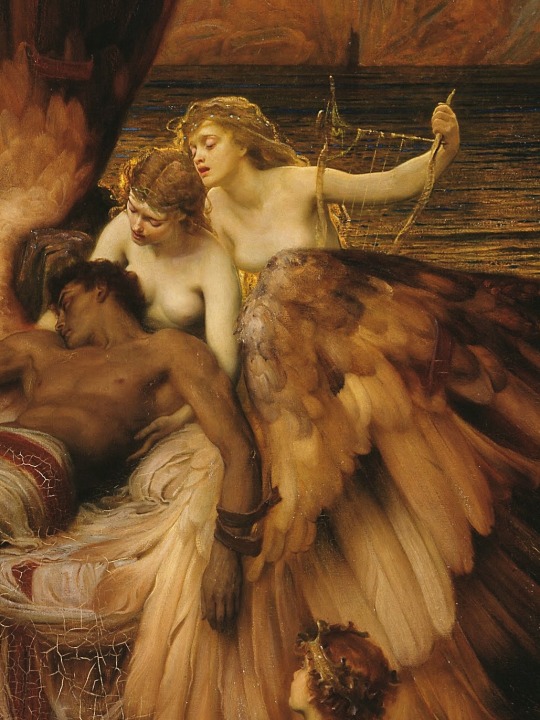
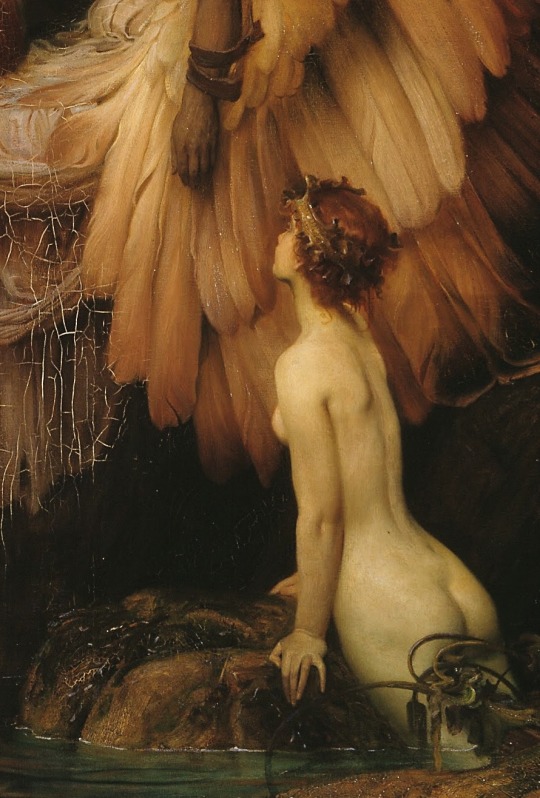
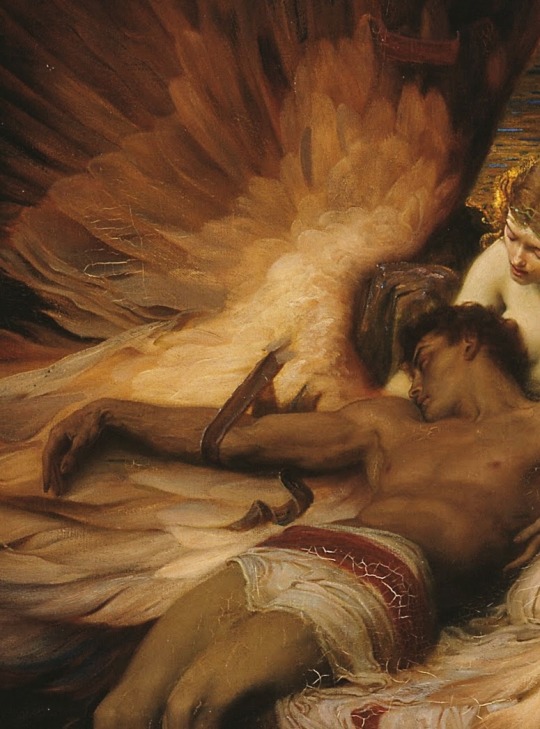
Details
DRAPER, Herbert James (1863–1920)
The Lament for Icarus, oil on canvas c. 1898
#19th century#details#herbert james draper#the lament for icarus#icarus#greek mythology#19th century art#art history#historical art#john william waterhouse#frederic leighton#artwork
474 notes
·
View notes
Text

lament (x)
[START I.D. An illustration of Angel Cheng Xiaoshi and Demon Lu Guang as the “Lament for Icarus” painting by Herbert James Draper, where Cheng Xiaoshi is Icarus. A tear rolls down Cheng Xiaoshi’s cheek as he lay numb against Lu Guang, his halo splitting in half. Lu Guang holds him in his arms and cries in grief. One of his tattered wings is slightly curled around one of Cheng Xiaoshi’s, as if to shield him. Both of them are covered in blood. All around them are loose feathers and bits from both their wings. END I.D.]
#link click#sgdlr#时光代理人#Shíguāng Dàilǐrén#shiguang dailiren#link click fanart#cheng xiaoshi#lu guang#the lament for icarus#jdraws#fought really hard w twitter img compression w this one
365 notes
·
View notes
Text
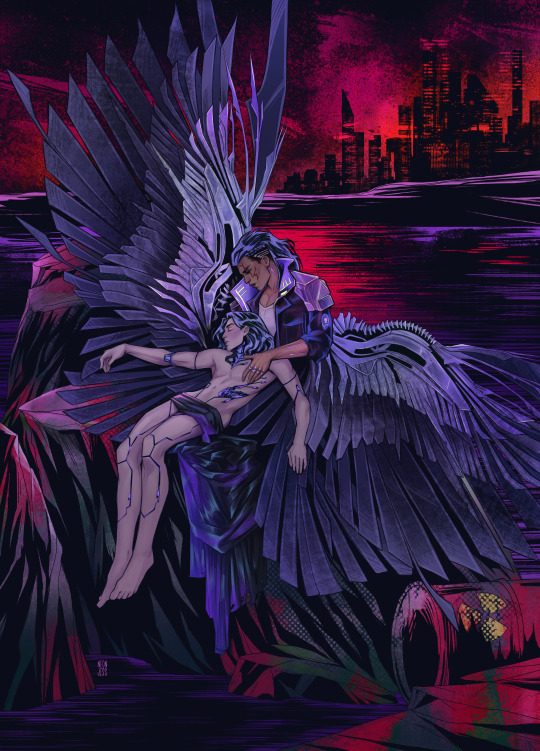
I made my cyberpunk couple Zack and Ash inspired by the Lament of Icarus
#cyberpunk character#cyberpunk art#cyberpunk#the lament for icarus#original character#artists on tumblr#boys love
150 notes
·
View notes
Text
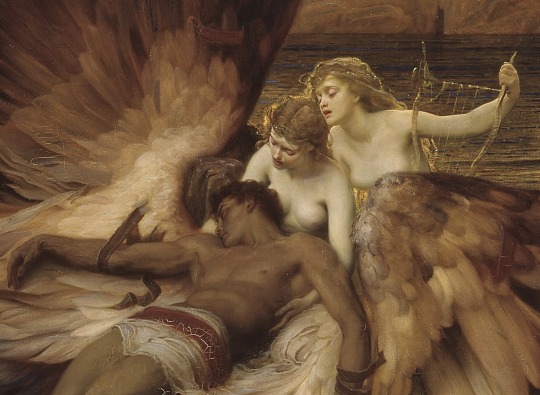
THE LAMENT FOR ICARUS — HERBERT JAMES DRAPER (DETAIL)
174 notes
·
View notes
Text

The Lament for Icarus – Herbert James Draper // gold rush – Taylor Swift
#icarus#the lament for icarus#herbert james draper#gold rush#gold rush song#gold rush taylor swift#evermore#evermore taylor swift#evermore album#evermore ts#ts evermore#taylor swift evermore#taylor swift#tsedit#tswiftedit#tswiftlyrics#art#art history#lyrics#lyric art
311 notes
·
View notes
Text
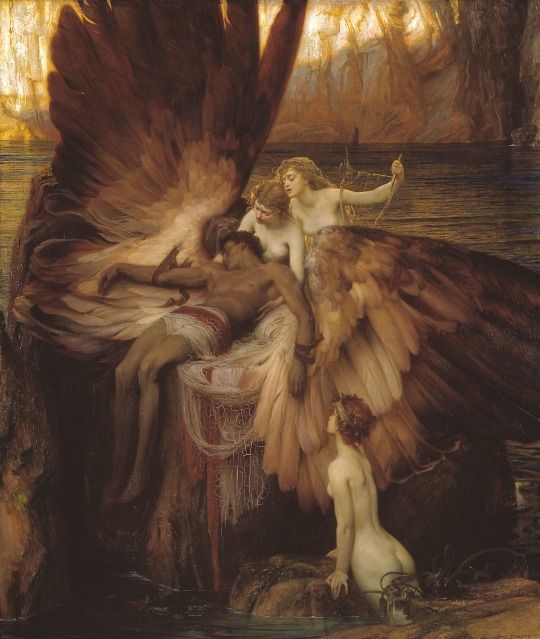
The Lament for Icarus (1898, oil on canvas) | Herbert James Draper
#art#fine art#painting#aesthetic#oil painting#19th century#dark#the lament for icarus#herbert james draper#mythological art
203 notes
·
View notes
Text
everything about icarus is so regulus black coded it makes me wanna cry, ESPECIALLY the poems
#marauders#dead gay wizards#regulus black#regulus arcturus black#regulus deserved better#regulus black coded#r.a.b#i cant do this#the lament of icarus
30 notes
·
View notes
Text
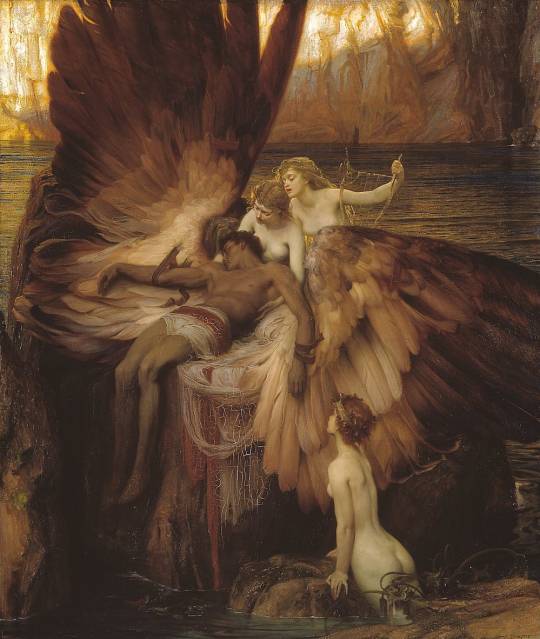
Herbert Draper - The Lament for Icarus.
37 notes
·
View notes
Text
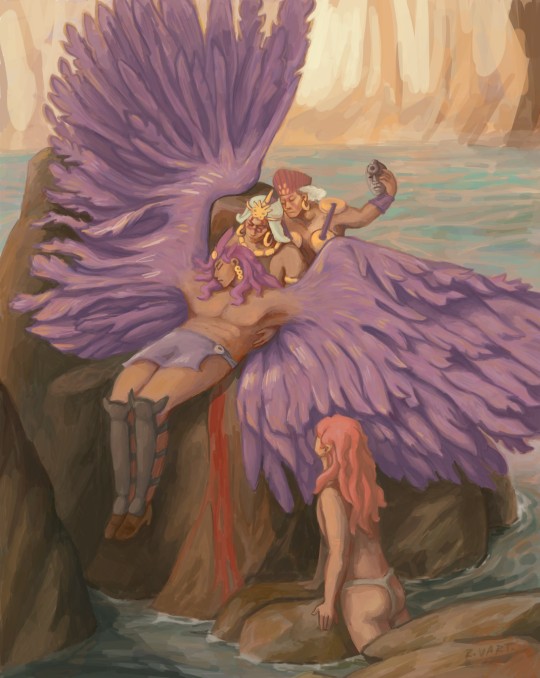
#artists on tumblr#digital art#jjba#jjba part 2#painting#kars jjba#pillar men#the lament for icarus#jjba fanart
135 notes
·
View notes